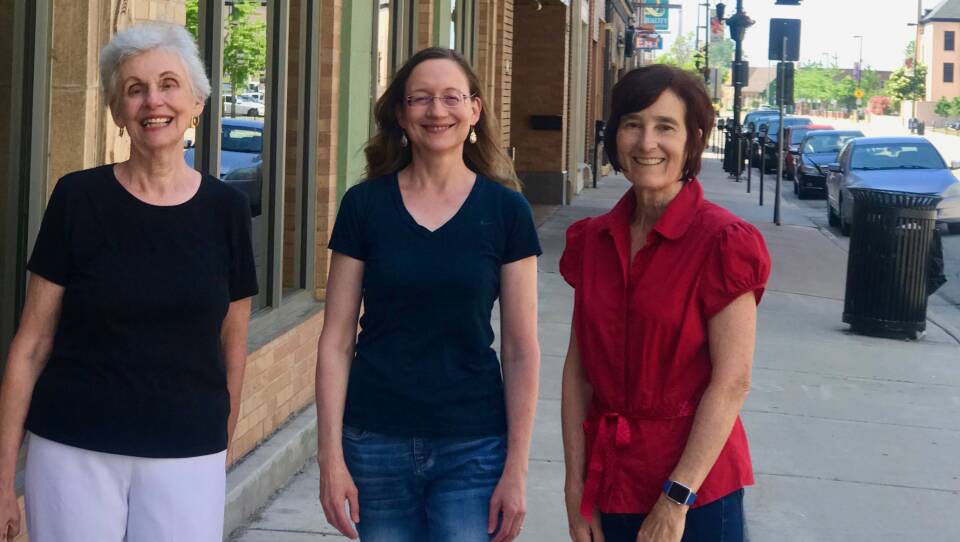“We're not where we need to be with this disease.”
Since Therese Barry-Tanner lost her mother to Alzheimer’s disease 14 years ago, she has been on a crusade to bring the harrowing and ultimately fatal disease out of the shadows and give it the attention it deserves.
Not only has she enrolled in one of the world’s largest family history studies of the disease at The University of Wisconsin-Madison, she has also co-produced Determined: Fighting Alzheimer’s, which will air on NOVA on April 6 on GBH 2. Alzheimer’s takes the lives of more than 120,000 Americans every year.
The documentary, which was produced over ten years, tracks three women in the Wisconsin study who all had mothers with Alzheimer’s and witnessed firsthand the devastation wrought by the disease, not only on the mind and body, but on patients’ families. The study monitors the health and memory of thousands of people in an effort to discover lifestyle changes and medicines that could delay or prevent the disease.
“Given what my family went through, I wanted to try to tell the story of this disease in a different way — a more personal way,“ says Barry-Tanner.
But there was a hitch: Barry-Tanner was a health insurance professional, not a filmmaker. Through a friend, she connected with public media producer Eileen Littig, who connected Barry-Tanner with a film director who she was sure would be interested.
That filmmaker, Melissa Godoy, also happens to be Littig’s daughter.
The mother-daughter duo has worked on numerous projects, including Do Not Go Gently, the 2007 award-winning documentary narrated by Walter Cronkite about creativity and aging.
Godoy, who was also a line producer for American Factory, winner of the 2020 Oscar for Best Documentary Feature, said that Barry-Tanner’s idea arrived at just the right time in her life.
“I had been working in nursing homes doing creative work and storytelling with people with early-stage Alzheimer’s,” she says.
Godoy also suspected that her love for the verité style of observational storytelling would pair perfectly with the Alzheimer’s story.
With Littig and Godoy’s filmmaking chops and Barry-Tanner’s personal passion, the team set out to find families that would willingly allow cameras into the most personal and painful aspects of their lives.
They found them in Barb, Sigrid and Karen. Barb and her family care for their dying mother in a rural corner of Wisconsin; Sigrid, a retiree, is exploring lifestyle changes that she hopes can stave off the threat; and Karen is struggling to raise her adolescent son in Milwaukee soon after her mother’s death from Alzheimer’s.
“These three women show such inspiring courage in their willingness to confront their own possible risk factors and doubly so for being generous enough to share their stories with us,” says NOVA Co-Executive Producer Chris Schmidt.
In some of the film’s most heart-wrenching scenes, viewers bear witness to the final stages of Barb’s mother’s life.
“We knew it was important to have a person in the film who was actively living with the disease,” says Barry-Tanner.
Being part of those family moments was especially poignant for the filmmakers.
“We wanted to capture everything as well as we could, but not interrupt,” says Godoy, adding that they filmed eight times at the family’s home over multiple years. “We tried to quietly blend in with the family.”
Some scenes are difficult to watch, says Barry-Tanner. “There aren’t many places you see late-stage Alzheimer’s on film. But when people connect emotionally, it helps build awareness.”
At the same time, she adds, those scenes are beautiful. “The family’s love was far more potent to me than the mother’s declining state.”
The film started out as a local Wisconsin project with a small crew and has now been seen at regional film festivals in the U.S. and Canada.
Determined: Fighting Alzheimer’s also captures the challenges of research, including the deep-rooted mistrust of medical trials in underserved communities that stems in part from the history of unethical experiments on people of color.
With NOVA Co-Executive Producers Julia Cort and Chris Schmidt, they worked to find the right balance between exploring the most current research and telling the compelling human stories.
“We’re so proud to bring this intimate and powerful film to NOVA audiences. Melissa and Therese beautifully capture not only the pain of having a loved one with Alzheimer’s, but also the challenges and the hope of scientific research into the disease,” says Co-Executive Producer Julia Cort.
“Having this film on NOVA is a dream come true,” says Barry-Tanner.
“In making this film, I realized that the progress of science is not a ‘them’ thing,” adds Godoy. “It's not ‘what have they found?’ or something that other people do. It's about us. Scientific progress requires us all to participate as we can.”




